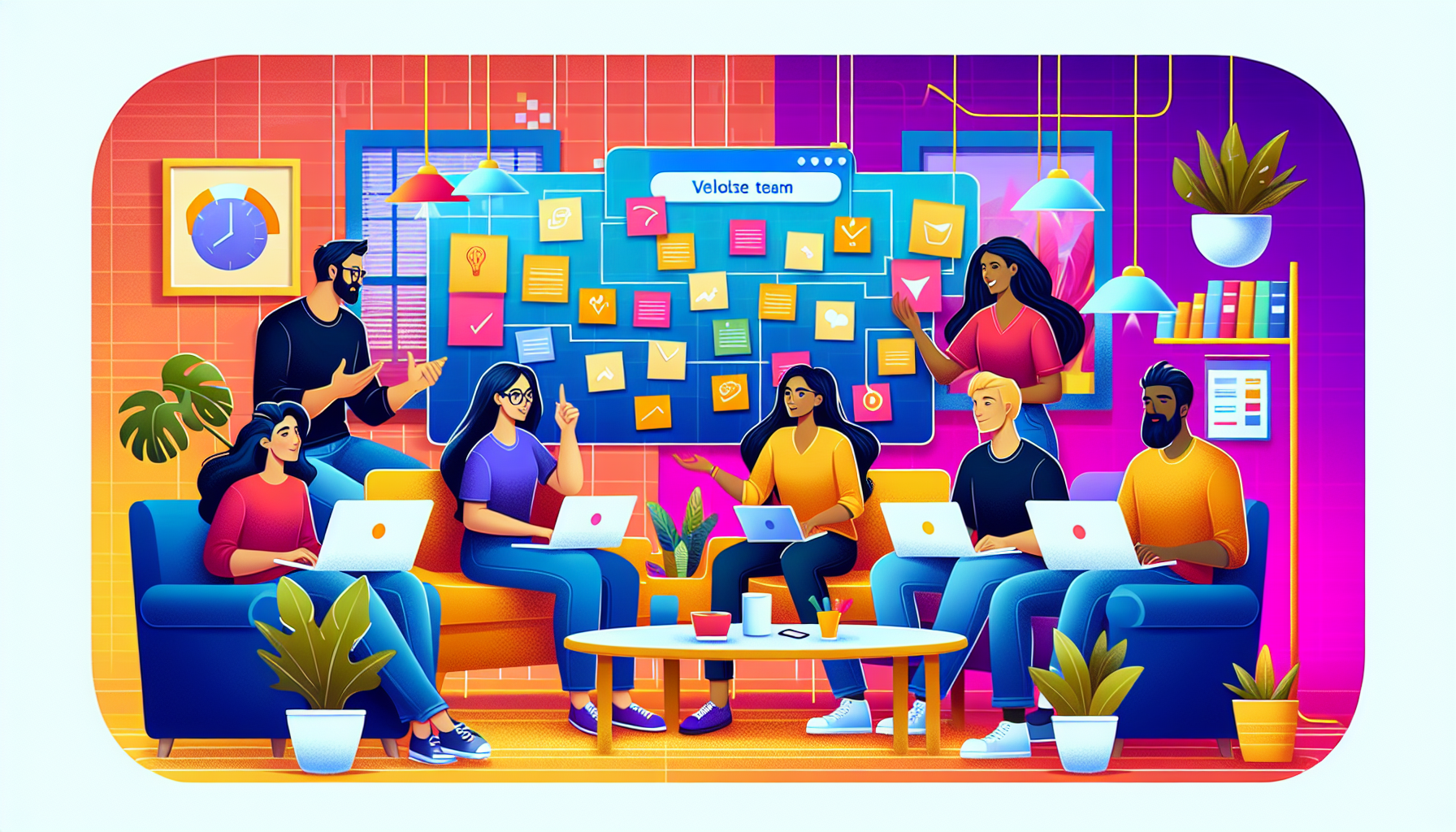Building effective remote software development teams, from collaboration to innovation: how to build effective remote software development teams that innovate starts with strong collaboration. This guide covers essential steps from hiring to leveraging technology for peak performance.
Key Takeaways
- Remote software development teams benefit from a diverse talent pool, offering improved creativity and flexibility while facing challenges related to communication and time zones.
- Hiring processes for remote teams should prioritize communication skills, cultural fit, and the ability to work independently to ensure effective collaboration.
- A strong onboarding process and the utilization of Agile methodologies are key for maintaining engagement and performance, while regular performance evaluations and training are essential for data security and compliance.
The Benefits and Challenges of Remote Software Development

Before:
Remote software development teams, consisting of individuals working from various locations globally, offer significant advantages. One of the primary benefits is access to a diverse talent pool, enabling companies to find skilled workers regardless of geographical limitations. This diversity not only enriches company culture but also leads to improved creativity, problem-solving, and innovation.
After:
Remote software development teams offer significant advantages, including:
- Access to a diverse talent pool, enabling companies to find skilled workers regardless of geographical limitations
- Enrichment of company culture through diversity
- Improved creativity, problem-solving, and innovation, especially when collaborating with remote software engineering teams.
Flexibility and cost savings are other major advantages of remote software development. Teams can adapt to changing circumstances more easily, and companies can reduce costs associated with office space and other overheads. However, managing remote teams also presents challenges, such as communication barriers and time zone differences, which can hinder collaboration and project clarity.
Effective management of remote teams relies on establishing robust procedures, proper scheduling, and fostering a strong team spirit. Mismanagement can have severe consequences, slowing project progress and hindering innovation. Understanding these benefits and challenges is crucial for successful remote software development.
Access to Global Talent Pool
Remote work has transformed the traditional hiring landscape, allowing companies to hire tech talent from across the globe. This access to a diverse and skilled workforce is crucial for companies to thrive in the competitive tech industry.
The diversity offered by remote workers enriches company culture and leads to improved creativity, problem-solving, and innovation.
Flexibility and Cost Savings
One of the key benefits of remote work is the flexibility it offers. Developers can choose their work hours, including working odd hours, which contributes to a better work-life balance. Additionally, remote work helps employees save costs by reducing transportation, wardrobe, and food expenses.
This model is not only cost-effective but also boosts performance and customer satisfaction.
Communication and Time Zone Differences
Clear and effective communication is essential for managing a remote software development team. Communication is the most important issue for remote teams, significantly impacting their success. Time zone differences can be turned into opportunities, allowing for around-the-clock efficiency and timely feedback.
Implementing a strict schedule and organized workflow can help manage communication effectively within remote teams. Video conferencing tools like Zoom and Google Meet are crucial for maintaining face-to-face interactions and optimizing communication among remote team members.
Hiring the Right Talent for Your Remote Software Development Team

A reliable hiring process is crucial when building a remote software development team. Defining the skills and competencies required for remote developers before initiating the hiring process is important. Trusting in candidates’ skill sets and abilities is crucial when hiring for remote positions.
Common models for hiring a remote development team include project-based, dedicated team, and staff augmentation. With a strong focus on the right talent, companies can leverage specialized services that help source, vet, match, and manage remote developers effectively.
Emphasizing Communication Skills
Key skills for candidates include excellent communication skills, emotional intelligence, clear speech, and active listening. Constant communication is vital for keeping remote developers integrated with local teams.
Individual meetings are beneficial for understanding the specific needs of remote developers.
Cultural Fit and Growth Mindset
Cultural fit is crucial for integrating into team culture despite limited interactions in remote work environments. Ensuring cultural fit helps in creating a cohesive team environment, which can lead to better collaboration and productivity.
A growth mindset in candidates indicates their willingness to learn and adapt to new challenges, making them valuable assets to remote teams.
Independent Work Capability
Seeking candidates who are self-motivated and can work independently is vital for remote roles. Self-motivated, capable of working independently and autonomously should be key qualities when hiring a remote development team member.
Leaders should provide autonomy to remote teams to foster independent work capabilities.
Effective Onboarding Processes
Managing the onboarded remote development team is the second important step after hiring. Effective onboarding improves employee retention by 82%. Companies can improve their onboarding process for remote team members by customizing it for each new hire, reflecting their experience, and meeting company requirements.
New hires are twice as likely to seek other opportunities after a negative onboarding experience. Therefore, a well-structured onboarding process, including detailed documentation and clear processes, is essential for ensuring a smooth transition.
Detailed Documentation and Clear Processes
An effective onboarding process for remote developers includes detailed documentation and clear processes. Key elements of the onboarding plan should include showing the virtual office and explaining the company’s vision and mission.
Developers need to demonstrate strong verbal and written communication skills to facilitate effective remote collaboration, especially for software developers.
Facilitating Online Meetings and Participation
Regular online meetings help remote team members stay informed and engaged with company goals and activities. These meetings ensure that team members are aware of important updates and company priorities.
Participating in company events fosters a sense of belonging and connection among new hires.
Leveraging Agile Methodologies for Remote Teams

Agile culture is crucial for remote teams to maintain effectiveness and productivity. Open and intentional communication creates comfort for remote developers when asking questions and seeking guidance. Sprints are typically short, time-boxed periods that allow teams to be responsive to changes in project requirements.
Effective team collaboration is critical for managing remote teams and relies on leveraging global talent and ensuring regular updates. Utilizing project management tools like Asana, Wrike, and Zoho Projects can help visualize tasks and manage resources effectively.
Implementing Scrum and Sprints
Scrum is a framework that helps teams manage tasks and projects effectively in a collaborative environment, especially in remote settings. Sprints are time-boxed iterations that allow teams to focus on specific tasks, fostering productivity and accountability.
Implementing Scrum and sprints in a remote team context can significantly improve task management, team alignment, and project outcomes.
Continuous Feedback and Adaptation
95% of organizations using Agile development reported improved productivity through continuous feedback. Daily standups and one-on-one meetings facilitate regular check-ins, ensuring team members feel connected.
Continuous feedback loops in Agile enable teams to refine processes based on performance issues encountered.
Utilizing the Best Tools for Remote Collaboration

Utilizing daily check-ins on communication platforms ensures team members stay informed about ongoing developments. Implementing a specific default time zone based on the main office fosters better scheduling and communication for remote teams. According to the Agile methodology, standups and effective communication are essential for any remote-first software development team.
Utilizing a shared calendar helps in planning projects and scheduling meetings visually, ensuring everyone is on the same page. Cloud-based development environments have greatly improved accessibility to resources and tools for remote developers.
Project Management Software
Recommended project management tools for remote software development teams include ClickUp, Jira, and Trello. ClickUp enhances focus for remote development teams by offering integrations with over 1,000 other tools, along with functionalities like automated workflows, sprint backlogs, issue tracking, roadmaps, and Agile dashboards.
Communication Tools
Slack, Microsoft Teams, and Zoom are recommended communication tools for effective communication among remote team members. Zoom and Google Meet are essential tools for video conferencing in remote teams.
Chat applications facilitate communication and quick feedback among remote team members.
File Sharing and Collaboration Platforms
Dropbox is a cloud-based file storage solution that streamlines file organization, sharing, and collaboration among remote teams. Utilizing platforms like Google Drive and Dropbox enhances team effectiveness by allowing real-time collaboration and easy access to files.
Building a Strong Company Culture Remotely

Creating a strong company culture in a remote setting relies on transparency, shared values, and continuous engagement among team members. Regular check-ins foster a sense of connection and promote early identification of potential challenges within remote teams.
Utilizing regular video conferences helps strengthen connections between remote team members. Cross-departmental collaboration helps to break down silos and encourages diverse perspectives, which can lead to innovative solutions.
Regular Team-Building Activities
Engagement in virtual teams is crucial to prevent feelings of isolation and reduce the risk of burnout. Regular virtual social gatherings, like online lunch dates, can help strengthen relationships and improve team dynamics.
Implementing regular team-building activities can lead to increased morale and a stronger collaborative spirit within remote teams.
Encouraging Open Communication
Establishing a culture where team members feel comfortable sharing their thoughts is crucial for remote teams to thrive. Open communication encourages team members to share ideas, leading to better collaboration and innovation.
Celebrating Achievements and Milestones
Recognizing individual contributions through personalized rewards can foster a sense of belonging in remote teams. Celebrating achievements and milestones helps maintain team bonds and boosts morale.
Implementing recognition and celebration strategies contributes significantly to team cohesion and engagement in a remote work environment.
Monitoring and Measuring Performance
Informing remote teams about updates during company-wide meetings is crucial to establish clear expectations and goals. Measuring the performance of remote developers should focus on the outcomes they produce rather than their activity levels. Regular check-ins and setting clear KPIs help maintain accountability and assess productivity effectively.
Creating a cohesive team environment enhances communication, which is essential for managing remote developers effectively.
Setting Clear Goals and Expectations
Specific and measurable goals are crucial for assessing the performance of remote employees. Goals should include clear timelines, measurable KPIs, and targets to provide direction for the development team.
Effective communication is crucial to avoid misunderstandings and ensure project goals are met.
Using Key Performance Indicators (KPIs)
Common KPIs for remote teams include revenue growth, project schedule adherence, and customer satisfaction. Involving development teams in sharing metrics fosters collaboration, ownership, and continuous improvement.
Key Performance Indicators (KPIs) are essential tools for measuring productivity and success in remote software development teams.
Regular Performance Reviews
Regular performance evaluations help employees anticipate feedback and work on improving their skills. Conducting regular performance reviews ensures that employees receive consistent feedback and stay aligned with team goals.
Ensuring Data Security and Compliance
Security and compliance are primary concerns for remote software development teams. Remote teams face challenges in IT oversight due to limited physical access to hardware and software. Leaders must be proactive in safeguarding against compliance issues and ensuring security in remote settings.
Comprehensive documentation is vital for helping remote employees understand company policies and procedures. Implementing robust security measures and providing proper training is crucial to protect sensitive information in remote work environments.
Implementing Security Measures
Utilizing advanced access controls, such as multi-factor authentication, is crucial for protecting sensitive data in remote settings. Using multifactor authentication can significantly enhance security by requiring users to verify their identity through multiple channels.
By employing these security measures, organizations can significantly mitigate the risks associated with remote access and protect sensitive data more effectively.
Providing Regular Training Sessions
Ongoing training is vital for ensuring team members are well-informed about necessary security protocols in a remote work setting. Regular training sessions help maintain compliance with industry regulations by educating team members on updated security practices.
Implementing a structured training program is essential to reinforce security measures among remote workers.
Fostering Innovation in Remote Teams
Creating a culture of trust and psychological safety is essential for encouraging creativity in remote teams. Regular brainstorming sessions can significantly enhance creativity by allowing team members to freely share and discuss unconventional ideas. Providing autonomy to team members can increase their confidence and willingness to explore innovative solutions.
Offering professional development opportunities not only enhances skills but also fosters a sense of belonging and engagement among team members. Cross-functional collaboration not only enhances problem-solving but also broadens team members’ perspectives, fostering innovation.
Encouraging Creative Thinking
Incorporating brainstorming sessions in a structured manner can significantly enhance the flow of creative ideas among team members. Encouraging unconventional ideas during brainstorming can lead to innovative solutions that might otherwise remain unexplored.
Providing Opportunities for Professional Growth
Supporting skill development and cross-functional collaboration can enhance creative problem-solving within remote teams. Offering professional development opportunities not only enhances skills but also fosters a sense of belonging and engagement among team members.
Facilitating Cross-Functional Collaboration
Cross-functional collaboration can lead to innovative ideas but also presents challenges such as communication barriers and varying work styles. Implementing agile methodologies facilitates collaboration by promoting adaptable roles and continual feedback.
Encouraging creative thinking and providing professional growth opportunities can significantly boost innovation within remote teams.
Summary
Building effective remote software development teams requires a strategic approach that encompasses hiring the right talent, implementing robust onboarding processes, leveraging agile methodologies, and fostering a strong company culture. Utilizing the best tools for remote collaboration, ensuring data security and compliance, and continuously monitoring and measuring performance are also crucial for success.
In conclusion, by implementing these top strategies, companies can overcome the challenges of remote work and build successful remote software development teams. Embrace the opportunities presented by remote work environments and foster innovation and productivity within your remote teams.
Frequently Asked Questions
What are the key benefits of remote software development teams?
Remote software development teams offer significant advantages such as access to a global talent pool and enhanced creativity from diverse perspectives. Additionally, they provide flexibility and cost savings, making them an attractive option for businesses.
How can companies ensure effective communication within remote teams?
To ensure effective communication within remote teams, companies should utilize video conferencing tools, establish a default time zone, conduct regular stand-up meetings, and promote open communication. These strategies foster collaboration and clarity among team members.
What are the essential qualities to look for when hiring remote developers?
When hiring remote developers, prioritize excellent communication skills, self-motivation, and cultural fit. These qualities ensure effective collaboration and independent work in a remote environment.
How can companies foster a strong company culture in a remote setting?
To foster a strong company culture in a remote setting, companies should prioritize regular team-building activities, maintain open communication, celebrate achievements, and build a foundation of trust and psychological safety among employees. This creates an engaging and cohesive remote work environment.
What measures should be taken to ensure data security in remote software development teams?
To ensure data security in remote software development teams, it is essential to implement multi-factor authentication, provide regular security training, and maintain comprehensive documentation of policies and procedures. These steps create a robust framework for protecting sensitive information.
About InTech Ideas
If you’re looking to elevate your tech strategy and drive business growth, InTech Ideas is here to help. We offer a comprehensive suite of services, including Software Development Teams, Product Development Fast Track, and Product Leadership & Advisory. Whether you need to scale your development team, fast-track your product, or bring in expert leadership, we provide tailored, people-first solutions that align with your company’s goals. Learn more about how we can support your journey by exploring our services or contacting us today to discuss your specific needs.

